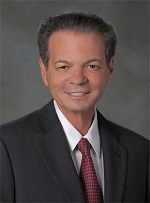 |
| AbbVie CEO Richard Gonzalez |
Didn't like the old AbbVie? Perhaps you should consider New AbbVie.
The pharma giant ($ABBV) laid out its case for a $46 billion takeover of Shire ($SHPG) today, insisting that their complementary pipelines and product base covering a full range of categories, global sales operations and a quick tax inversion--moving its tax base to the U.K. while retaining its headquarters in Chicago--made the numbers for a post-merger New AbbVie look great.
Taking a lesson from Pfizer's ($PFE) failed bid to acquire AstraZeneca ($AZN), which kicked up a fracas in London as politicians railed against the prospect of a buyout, AbbVie stayed focused on the positives: Continued R&D spending, improvements in marketing for Shire's rare disease drug portfolio, more investments. And then there's a 13% U.K. corporate tax rate to consider, which would save the company a bundle.
"New AbbVie intends to maintain its investment grade ratings profile with significant cash flow generation which AbbVie believes would provide significant capacity for continued business development and R&D spending, as well as enhanced return of capital to shareholders," the company said in a statement.
For some reason, AbbVie adds, Shire's board keeps saying no to every sweetened offer--even though they represented a hefty premium over the already high price which had been swelled by persistent rumors of a takeover bid.
"This combination would give us the opportunity to maximize the potential of Shire's rare disease and neuroscience franchises through our complementary platform, with established presence in more than 170 countries across the globe, and is further enhanced by the strength of our R&D in areas of high unmet need, and our commercial and manufacturing capabilities," AbbVie CEO Richard Gonzalez said in a statement. "We believe this highly executable proposed transaction will build long-term value for the patients, employees and shareholders served by both companies, and will grow our combined product portfolios and pipelines and deliver superior returns to shareholders."
All of these maneuvers, though, are part of the customary choreography involved in a big buyout. Boards play hard to get, the price rises, and the right number gets the negotiating started. In a call with analysts today Gonzalez pointedly declined to rule out a hostile bid and noted that he will now start contacting big Shire investors to start gaining their support.
But the bid will likely have to go significantly higher before Shire surrenders to a big sale. Bloomberg polled a group of analysts and found that $51 billion, a bit more than a 10% boost, would probably do the trick.
"It's all about a price," Panmure Gorden's Savvas Neophytou tells Bloomberg. "I personally think this deal will get done."
Despite AbbVie's insistence that it already has the global structure and product base needed to make this deal work, its primary motivation is expanding its pipeline and portfolio. When AbbVie split off from Abbott, it set out relying primarily on its huge sales from Humira. Shire would add a big ADHD drug--Vyvanse--while opening up rare diseases. AbbVie's main claim to fame in R&D is based on its work on a new hepatitis C cocktail, which looks very promising. And Shire's billion-dollar annual budget for R&D wouldn't necessarily immediately trigger the need for deep cuts. A fresh move to make the leap to the U.K. for tax purposes may generate some response in the U.S. Congress, but lawmakers are slow to move these days.
- here's the release
- here's the report